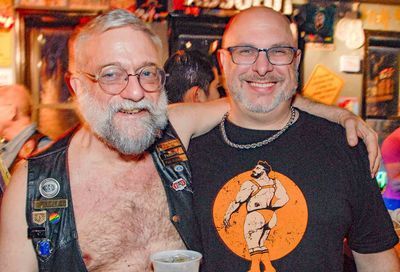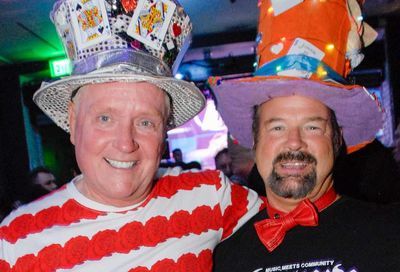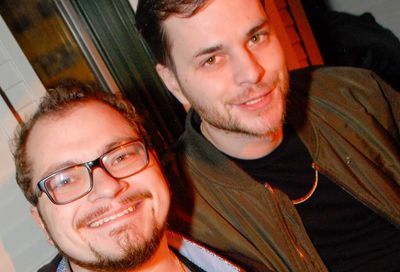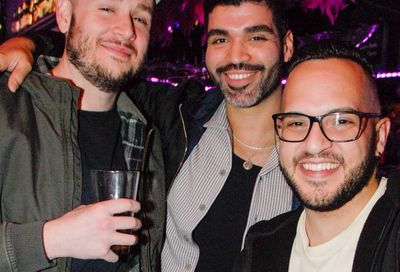Brokeback's Lack
Commentary: OutRight
In a 1980 essay entitled “The Boys on the Beach,” conservative writer Midge Decter described the gay men who summered at Fire Island in the 1960s:
“No households of wives and children requiring security; no entailments of school bills, doctor and dentist bills; no lifetime of acquiring the goods needed for family welfare and the goods desired for family entertainment, with a margin left over for that greatest of all heterosexual entailments, the Future: no such households burdened the overwhelmingly vast majority of homosexuals.”
Homosexuality, argued Decter, is a flight from adult responsibility. Heterosexual men who accept their share of the burden to raise the next generation feel “mocked,” especially by gay men, because male “homosexuality paints them with the color of sheer entrapment.” Being gay, she concluded, means “taking oneself out of the tides of ordinary mortal existence.”
From early on in Brokeback Mountain, the Oscar-contending film by director Ang Lee, I found myself thinking about Decter’s essay.
The basic story is by now familiar: two young men, Ennis Del Mar (Heath Ledger) and Jack Twist (Jake Gyllenhaal), meet and fall in love in 1963 while herding sheep in the mountains of Wyoming. Subsequently, they each get married and have kids but get together a couple of times a year to go “fishing,” the euphemism they give their wives for the periodic renewal of their affair. The story ends in 1983.
There’s much to admire in this film. Ennis and Jack bust stereotypes of gay men. They aren’t effeminate. When they meet, they are modern “cowboys” who live on profanity, fighting, country music, beer, and hard work for low pay. Yet their masculinity is also not the posed hyper-masculinity of leather, Levi and uniform fetish scenes.
There’s no mention of Stonewall, Harvey Milk, or even San Francisco. It’s a welcome corrective to the urban-centered study of gay life in America.
For the most part we do not see sensationalized homophobia. That would be too easy. Instead, we see the everyday contempt for gays that still suffuses life in much of the country. Disdain for homosexuals mostly comes to Ennis and Jack in the sneers of others and in their own shame.
Still, the film offers some support for the notion that homosexuality is “taking oneself out of the tides of ordinary mortal existence.” Critics have rushed to praise Brokeback Mountain as a universal love story. Perhaps that’s true, but it’s not the whole story.
It’s almost never mentioned that their affair is juxtaposed to the consequences of neglecting life’s obligations. The first time Ennis and Jack have sex they shirk their responsibility to watch the flock. That night, a sheep is killed by a wolf; the aftermath is graphically depicted. A large portion of the flock is ultimately lost while they frolic.
More importantly, in their occasional fishing retreats, Ennis and Jack leave behind families. They are adulterers. This doesn’t seem so terrible in the case of Jack, whose cartoonish wife is obsessed with her career and her press-on nails. But in the case of Ennis, the result is poignant. Rushing out of the house to meet Jack, Ennis bodily passes off his two daughters to his wife, who stoically bears the burden left by a homosexual fleeing his entrapment. Eventually they divorce.
The film speaks powerfully to the sense of lost love and opportunity every closeted gay person must feel. But it’s difficult to buy the idea that the love between Jack and Ennis is an unvarnished good thing made tragic only by a homophobic world.
Part of the reason is that the love story itself is a bit strained. Hollywood delights in acting of the stumbling-and-mumbling sort (think James Dean and Marlon Brando) because it is thought to convey authenticity. Ledger in particular nails this style. But the spare dialogue between Jack and Ennis puts a lot of interpretive pressure on the meaningful glances they exchange.
Their sexual intimacy seems contrived. The sex — full of wrestling and snorting — is the kind of sex that a person who’s neither gay nor a cowboy imagines gay cowboys must have.
But the deeper reason their love doesn’t completely register is that every time they go off together one is left wondering, what about the kids? What Ennis and Jack experience as an exhilarating liberation from the mundane and the stifling is for their families an abandonment. Ennis at least talks about living up to his familial obligations, but in truth he’s checked out of them almost from the start.
For these reasons, I couldn’t quite join in the symphony of sniffles I heard in the theater at the undeniably sad end of the film.
Yes, the world around Ennis and Jack channeled them into unhappy heterosexual lives. All concerned would have been better off if that hadn’t happened.
But once families have been formed, do we think they have no obligation except to fulfill their own deepest desires? Do we really believe that the only tragedy in the film is the thwarted love of these two men? Why is nobody in the gay community even considering this moral complexity?
Which brings us back to Midge Decter. Much that’s happened in the past quarter-century has discredited her view of homosexuality as escapism. But you would not know that from the sentimental and myopic reaction to this film, which sees in a multi-layered calamity only a beautiful but doomed gay romance.
Dale Carpenter is a law professor. He can be reached at OutRight@metroweekly.com.
Support Metro Weekly’s Journalism
These are challenging times for news organizations. And yet it’s crucial we stay active and provide vital resources and information to both our local readers and the world. So won’t you please take a moment and consider supporting Metro Weekly with a membership? For as little as $5 a month, you can help ensure Metro Weekly magazine and MetroWeekly.com remain free, viable resources as we provide the best, most diverse, culturally-resonant LGBTQ coverage in both the D.C. region and around the world. Memberships come with exclusive perks and discounts, your own personal digital delivery of each week’s magazine (and an archive), access to our Member's Lounge when it launches this fall, and exclusive members-only items like Metro Weekly Membership Mugs and Tote Bags! Check out all our membership levels here and please join us today!






















